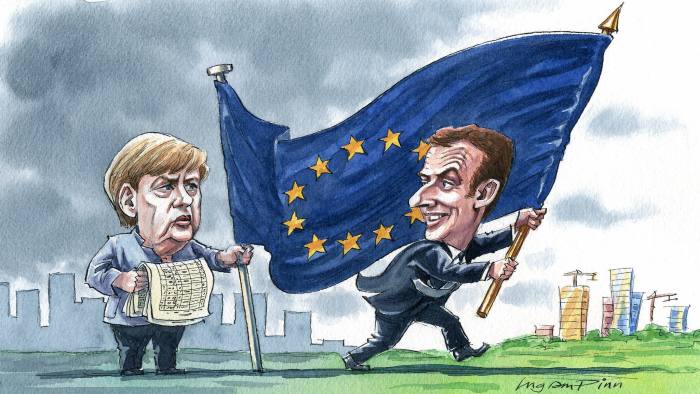Is Europe to miss a rare opportunity
Economies are growing; unemployment is falling. From Paris comes an avalanche of ideas to reinvigorate the EU. In Berlin, a polite public reception for French president Emmanuel Macron`s expansive vision struggles to conceal an ever tightening grip on Germany`s cheque book.Is Europe, you wonder, about to miss a rare opportunity?
For several years, Germany bemoaned the absence of a serious partner in Paris - a politician in the Elysée ready to modernise the French economy and restore the Franco-German dynamic to EU politics. If only, German policymakers lamented, the burden of European leadership could again be shared.
Angela Merkel`s government has got what it asked for. And more. Mr Macron`s passionate Europeanism is fused with the realism that says that France must put its own economic house in order. The months since the presidential election have seen the budget deficit cut, labour laws liberalised and taxes reduced. Mr Macron is paying for his seat at the table.
For Europe, the timing is as good as it is likely to get. The need for Europe to reinvent itself - for reforms to align the EU`s capacity with today`s challenges - for once coincides with the opportunity.
Some problems may not go away soon - the slide to illiberalism in parts of eastern Europe, the collision between Spain and Catalan separatists. But the cloud of perpetual crisis has lifted. Economic confidence in the eurozone is at its highest since 2001, the migration crisis has abated and populism mostly has been temporarily checked.
The challenges speak for themselves. The eurozone has been patched up, but the monetary union lacks strong economic foundations. The monopolistic power of American technology behemoths calls for an EU-wide sharpening of competition and tax rules. The 2015 refugee crisis exposed the weakness of the Union`s external frontier and tensions between national immigration rules and the Schengen open borders regime. Populism has exposed real grievances among the left-behinds.
Framed with the outsize confidence of a politician who had just upended the political order of France`s Fifth Republic, the vivid colours of Mr Macron`s project were always going to clash with the greys of Berlin. What I see now, however, are German politicians falling into a trap that the Brits never stepped out from during four decades of EU membership. Europe, in this self-defeating mindset, is a series of zero-sum transactions - entries on a bean-counter`s balance sheet, rather than the backbone of the continent`s peace and prosperity.
The Germany of not so long ago took a broader view. Not from altruism but for good reasons of selfish national interest. The Federal Republic`s economic welfare and physical security, not to say the reunification of the two Germanies, has all along rested on the three pillars of the postwar European order. Now they are being called into question.
The EU was at once the instrument of reconciliation with France and the answer to the fabled German question - how to accommodate a nation too big for its own continent and yet too small for the world. More than incidentally, it also supplied the marketplace for resurgent German industry. The Nato alliance added an essential security guarantee in the form of the US presence on the continent; and the Helsinki accords of 1975 put to rest the quarrels over borders long at the heart of European wars.
Events are chipping away at each of the three. Donald Trump`s elevation to the White House puts a question mark over how long the US will remain a European power. Russia`s annexation of Crimea and invasion of eastern Ukraine scorns the terms of Helsinki. For its part, the EU is losing Britain - an awkward partner maybe, but a European power for all that.
When Berlin`s policymakers dismiss Mr Macron`s plans for a eurozone budget as no more than a call for additional cash transfers from German taxpayers, they turn away from this broader understanding of the national interest. When politicians say the answer to eurozone strains is for others to behave more like, well, Germany, you wonder whether we are on the road from a European Germany to a German Europe.
The game is not lost. If one effect of the success in the election of the xenophobic Alternative for Germany was to shift politics in a nationalist direction, another was to persuade mainstream politicians that Germany badly needs a new deal to underpin Schengen. Reform of Schengen in return for strengthening the eurozone?

The chancellor`s allies say she is constrained for the moment by the sensitive coalition negotiations with the more Eurosceptic Free Democrats. Ms Merkel will never be an instinctive European, but she understands the geopolitics that root Germany`s interests in the architecture of European integration.
Others will tell you that France and Germany always start from very different places. French enthusiasm and German scepticism mark a natural division of labour. What matters is they then show the political will to strike a balance. Maybe. In Mr Macron France has a leader with the courage to speak for a stronger Europe. He is waiting for an answer from Berlin.
Huagong Innovation Technology Co.,Ltd.HGIT is a professional provider of polyurethane automatic equipment and sealing system solutions.The company is located in the beautiful coastal city -Dalian. E-mail:, TEL: +86-411-39525022 FAX: +86-411-39525009 Website:http:// foaming machine CNC PU Seal Pouring Machine Foam sealing gasket machine Foam sealing strip machine (FIPFG) Knurling machine Bridge cut-off machineAluminum thermal barrier potting system Two-color laminating machine for Aluminum PU Sealing gasket Machine Automatic spreading machineDispensing machine Strip feeding foaming machine
Machinery Brackets ,Metal Brackets ,Metal Shelf Brackets,Steel Brackets
Ningbo Metal Sharing Supply Chain Management Co., Ltd , https://www.zenlesf.com